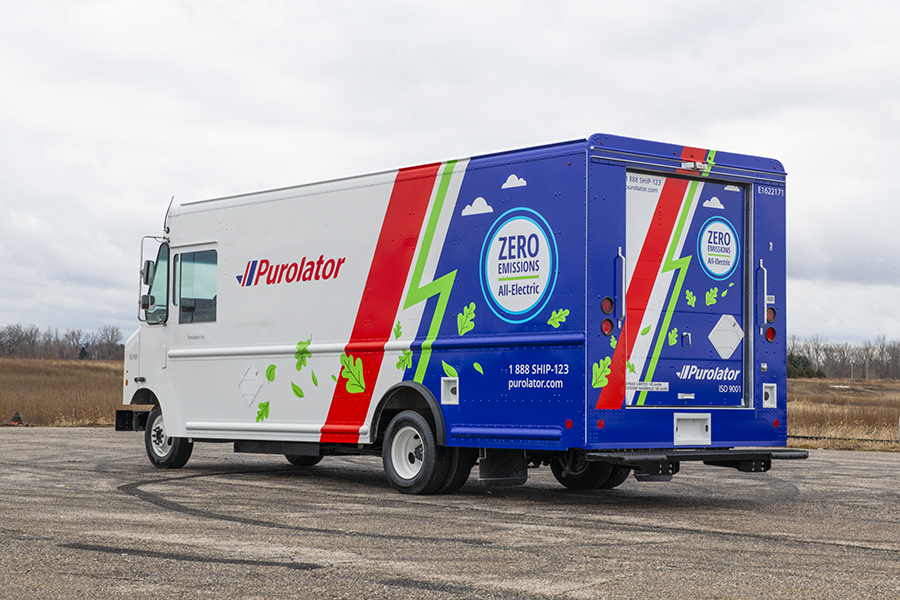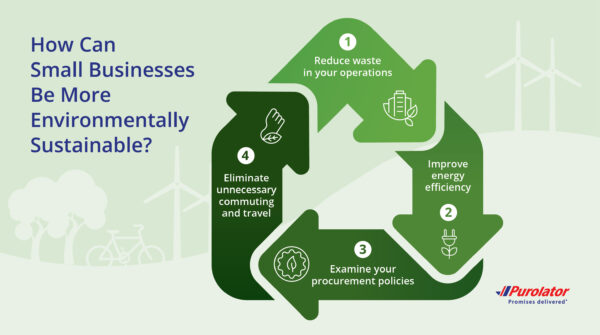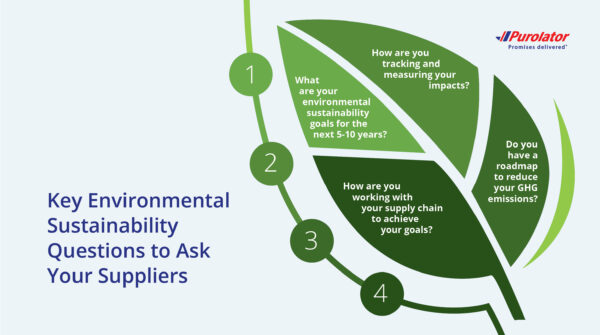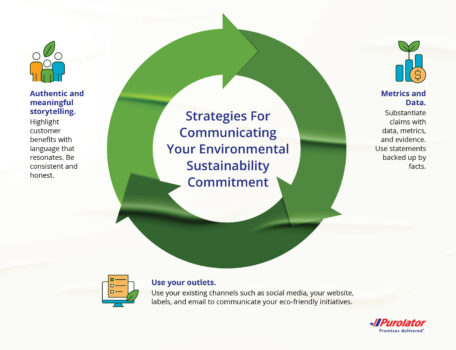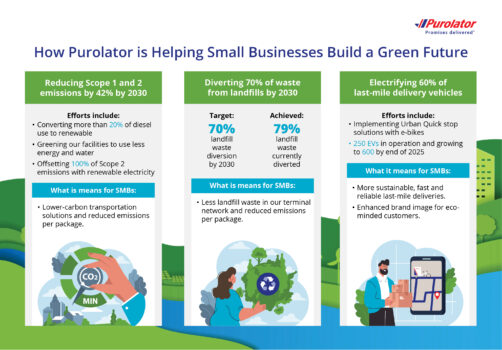Cindy Bailey
Vice President of Corporate Sustainability at Purolator Inc.
Cindy Bailey is the Vice President of Corporate Sustainability at Purolator. She leads the development of Purolator’s sustainability strategy, advancing policies and standards, managing risks and opportunities, and improving Purolator’s performance, disclosures, and reputation related to the environment, community investment, DEIB, and Health and Wellbeing. Currently, Cindy directs the development of Purolator’s emissions reduction goals and roadmap, which includes electrifying 60% of Purolator’s last-mile delivery vehicles by 2030 and achieving net-zero emissions by 2050.
In this article and webcast, Cindy Bailey, Vice President of Corporate Sustainability at Purolator, shares her expert tips and strategies for practical environmental sustainability for small businesses, including core areas of focus, key challenges and solutions, customer communication and how to leverage your supply chain partners to meet your decarbonization goals.
Learn more about incorporating environmental sustainability into your small business. Check out the Purolator Power Talks podcast. Check out the Purolator Power Talks podcast
Key takeaways
- What is environmental sustainability?
- Benefits of environmental sustainability for small businesses
- How can small businesses be more sustainable?
- Working with sustainable supply chain partners
- 3 key challenges and solutions for adopting environmental sustainability for small businesses
- How to communicate your commitment to sustainability to your customers
- How Purolator supports sustainability for small businesses
What is environmental sustainability?
Environmental sustainability is an effective method for small businesses to improve their social responsibility and focuses on how collective, small actions can contribute to the preservation of our planet and its natural resources.
Benefits of environmental sustainability for small businesses
According to McKinsey & Company, financially successful companies that integrate environmental, social, and corporate governance (ESG) priorities into their growth strategies outperform their peers. While ESG compliance is voluntary in Canada and the US, the benefits of adopting environmental sustainable practices are reason alone for small businesses to begin their decarbonization journey. They include:
- Reduced operating costs. Sustainable practices, such as energy efficiency and waste reduction lowers operating costs, which impacts your bottom line.
- Improved brand reputation and higher profits. A business’s environmental and social impacts motivates 77% of customers to complete a purchase. Environmental sustainability commitments attract new customers and strengthens customer retention.
- Increase competitive advantage. Products claiming ESG-related benefits account for 56% of retail sales growth, with the appeal of these products spanning across demographics regardless of age, income, life stage and location.
- Higher employee retention and talent attraction. 80% of young employees are more likely to stay at a company that supports environmental sustainability and 70% of US employees say environmental responsibility impacts their decision to accept a job offer.
As a shipping and logistics partner for businesses across Canada, Purolator understands the importance of sustainability and its role in business growth and longevity. At Purolator, we’re committed to building a greener future with organizations like yours. Our ambition is to be the greenest courier in Canada and achieve net-zero emissions by 2050.
How can small businesses be more sustainable?
Integrating sustainability ideas in the workplace doesn’t have to be daunting for smaller organizations. Bailey recommends identifying your business’s areas of environmental impact and finding solutions from there.
“What we’re seeing today is that if you want to be successful and viable in the future, you need to be thinking about sustainability, both the risks and opportunities that it brings, and embedding that into your core strategy,” says Bailey. “It can be small. It doesn’t have to be expensive. It doesn’t have to take a lot of resources or a lot of effort.”
Here are Bailey’s four recommended areas to begin creating a small business sustainability plan:
Reduce waste
Bailey recommends looking at your operations and identifying ways to reduce waste. Businesses will immediately see savings by not paying for landfill services, while simultaneously increasing their product value through these sustainable practices. To reduce waste, Bailey suggests:
- Improving recycling practices
- Increasing use of sustainable materials
- Identifying opportunities to reuse or minimize packaging
- Removing unnecessary printing and paper use
- Purchasing used items for the office such as furniture and electronics
Improve energy efficiency
Increasing your organization’s energy efficiency is an easy win for small businesses. Bailey notes that certain investments can have a short payback period and be relatively easy to implement. As a business, you may consider:
- Installing LED lighting
- Turning off lights or adding motion-detecting sensors
- Purchasing energy-efficient appliances
- Utilize smart thermostats that can be programmed to adjust temperatures based on occupancy and time of day
Eliminate unnecessary commuting and travel
In a post-pandemic world, virtual business practices have made it easy for organizations to cut down on unnecessary travel and commuting to save money and reduce carbon impact. When planning meetings and events, consider if travel is really necessary. With the popularity of hybrid workplaces, the majority of businesses are already set up to take advantage of virtual meetings and collaboration.
Implement responsible procurement policies
Each stage of your supply chain is connected to your business, which means reducing your environmental impact with your suppliers has a direct benefit to you. Bailey recommends looking for partners and suppliers with similar values that prioritize environmental sustainability. This is a low-effort way to bring savings and more eco-friendly practices into your business.
Learn more about practical decarbonization strategies for businesses, including how to reduce emissions and eco-friendly shipping tips.
Working with sustainable suppliers and partners
According to Bailey, working with suppliers focused on environmental sustainability in their products and services brings automatic benefits to your small business by reducing the your supply chain impacts. Also, working with experienced partners allows you to learn quickly so you can adopt similar practices. Here are 4 key questions to ask to evaluate the environmental commitments of your suppliers and partners.
4 key sustainability questions to ask your procurement partner
- What are your environmental sustainability goals for the next 5-10 years?
This question asks your suppliers to quantify their environmental commitments and provide a roadmap for you to verify their authenticity and value alignment.
- How are you tracking and measuring your impacts?
Measuring and tracking performance with data can signal to you how their initiatives pass benefits along to their customers through more sustainable products and services. - How are you reducing your waste generation?
Your suppliers may explain their waste reduction, recycling and reuse strategy and sustainable packaging efforts. - What sustainable practices and innovations are you using throughout your operations to minimize your carbon footprint?
This may include how your suppliers differentiate themselves from competitors by applying innovative solutions to reduce their impact.
With these questions, you can evaluate how your suppliers can help you reduce your environmental impacts and how they fit with the future direction of your business.
Learn more about practical decarbonization strategies for businesses, including how to reduce emissions and eco-friendly shipping tips.
3 key challenges and solutions for adopting environmental sustainability for small businesses
Your commitment to environmental sustainability means anticipating potential challenges and integrating solutions into the foundation of your strategy.
“It’s really important to prioritize quick wins and focus on continuous improvement in your operations. Identify opportunities that won’t take a lot of effort or a lot of money but are going to generate a big impact and build momentum,” says Bailey.
Here are the top challenges that small businesses may face as they adopt more sustainable practices and how to solve them.
1. Cost and Resources
Challenge: The cost of implementing environmental sustainability initiatives may seem overwhelming for your small business. Given the resources and investments that might be required, you may hesitate to adopt eco-friendly solutions despite the benefits.
Solutions:
- Culture. Engage with your employees and integrate sustainable thinking into your core values and mindset with a focus on continuous improvement.
- Partnerships and collaborations. Look for partnerships with experts in the field that can help lower costs, improve efficiencies and create funding opportunities. Collaborate with your industry peers and learn from one another.
- Government funding and incentives. Look for sustainability grants for small businesses, incentive programs, low-interest loans, and tax breaks.
2. Lack of Knowledge
Challenge: Many small business owners wear many hats, which means you may not feel equipped to take on sustainable practices without an in-house expert.
Solution: Small businesses like you are recognized for being creative and ingenious. Partner with non-governmental organizations or universities that can provide resources, expertise, and guidance at minimal or no cost.
3. Regulation Compliance
Challenge: You may feel overwhelmed and do not know where to start when it comes to environmental regulations and requirements for small businesses.
Solution: Industry groups are an excellent resource for learning, collaboration and sharing of best practices. For example, Canadian Business for Social Responsibility is an association that helps businesses understand sustainability principles and embed them into their strategies and practices. They offer peer-to-peer networking opportunities, workshops and resources such as their monthly policy briefs to support businesses who are committed to improving their social and environmental performance.
How to communicate your commitment to sustainability to your customers
Bailey stresses that in the era of greenwashing and social apathy, authentic and transparent customer communication can go a long way.
Here are 3 strategies for communicating your strategy, goals, and ongoing performance to your customer:
- Authentic and meaningful storytelling. Highlight customer benefits with language that resonates and creates an authentic, meaningful narrative. Be consistent, transparent and honest.
- Metrics and Data. Substantiate your claims with data, metrics, and evidence. Make sure you use precise statements backed up by facts.
- Use your outlets. Use your existing channels, such as your social media, website, product labels, packaging and your employee ambassadors to share information about your eco-friendly initiatives.
As a business, it’s important to remember that customer communication is, at its core, about building and supporting a human-to-human relationship.
“Often, the pursuit of perfection gets in the way of taking action and doing the little bit that you can. Customers are not going to be upset if we’re taking action, even if we’re falling a little short,” says Bailey. “It’s important that we demonstrate we’re serious about doing our best, we set ambitious goals and if we fall short, we communicate where we went wrong and how we’re going to move forward. That’s what customers are looking for.”
How Purolator supports sustainability for small businesses
As a leading provider of integrated freight, package and logistics solutions, Purolator is committed to environmental sustainability that supports a greener future for the planet and businesses like yours.
Our environmental sustainability strategy focuses on our greatest areas of impact: greenhouse gas emissions and waste generation. When small businesses partner with Purolator, they see the immediate benefits through our lower-carbon transportation solutions, premium service, and brand appeal.
Here are some of the ways Purolator is supporting small businesses’ in achieving their environmental sustainability objectives:
- Reducing GHG emissions by 42.7% by 2030
Through the use of clean fuels and the electrification of vehicles across Canada, including e-bikes, trucks, and last-mile delivery vehicles, Purolator is reducing its fleet emissions and providing a lower-carbon service for small businesses. - Diverting more than 70% of waste from landfills by 2030
Purolator’s target was to divert 70% of landfill waste by 2030. By 2023, Purolator had exceeded this goal, with a current landfill waste diversion rate of 79%. As Purolator continues to innovate and improve its waste reduction, recycling, reuse, donation and sustainable packaging program, the benefits of these initiatives support small businesses and their goals. - Electrifying 60% of last-mile delivery vehicles
Purolator delivers reliable solutions and innovations for small businesses, giving them a competitive advantage while satisfying climate targets to build a more sustainable future. Celebrated in its express service for delivery time accuracy, Purolator has paired this expertise with the electrification of 60% of last-mile delivery vehicles. Small businesses are seeing the rewards of this commitment, with their deliveries meeting customer expectations and changing preferences while elevating their brand.
Partnering with a sustainable shipping partner is a practical first step to building a more sustainable small business. Add confidence to your shipping and logistics with the expertise and innovative solutions that help you reach your sustainability goals. Purolator is a shipping partner that understands your values and delivers eco-friendly solutions tailored to you.
Download our latest research to discover insights on how customer expectations are shaping sustainable shipping practices.
Approaching a more sustainable future with confidence
The act of building a better tomorrow is a shared effort and commitment. As a small business your environmental impact, no matter its size, makes a difference. More than ever, the act of participating in making positive impacts in the world is a powerful choice that speaks to existing and future customers, while preparing your business for the future. The act of adopting sustainability goals may feel overwhelming, but Bailey stresses that rather than focus on the end goal or certain results, small businesses should start with the first small action.
“It starts with understanding where you are, setting a baseline, and beginning to take those first steps,” says Bailey. “As you build momentum alongside your employees and create that embedded culture across your organization, you will see results.”
At Purolator, supporting small businesses wherever they are in their decarbonization journeys is a core part of our environmental commitment. As we continue to innovate and improve the environmental sustainability of our services, we are committed to creating better communities and futures with businesses like yours.
